5 Things You Need To Remember About Blade Runner Before You See 2049
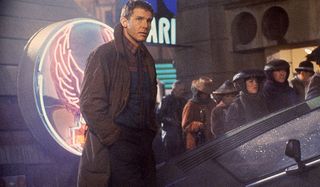
Ridley Scott's Blade Runner is heralded as a legendary science-fiction film in pop culture today, but it very much meets the qualifications for a cult classic. It inspired little attention and poor reviews when it first was released in 1982, but subsequent edits, home video releases, and special screenings helped it finally find the audience it deserves. Still, however, it remains a movie that hasn't been seen by absolutely everyone, which is why we're here to help you out before the release of the sequel, Denis Villeneuve's Blade Runner 2049.
The follow-up arrives in theaters this Friday, and I'm sure some of you are planning to buy a ticket but don't have time for a refresher course on the original. To help you, we've put together this handy guide that will fill you in on everything you need to know. It's worth noting that you can go into Blade Runner 2049 completely fresh and still get a lot out of the experience -- but what you'll learn below and on the next few pages will simply enhance your viewing!
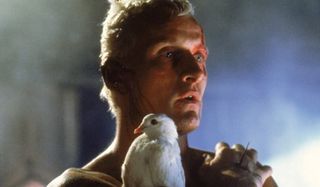
What Are Replicants?
Though the futuristic vision of Syd Mead may look stunning in cinematic form, the reality is that the Earth featured in the world of Blade Runner is a total mess. Expansion of human development ravaged the ground and the atmosphere, and all animals are dead -- which leads to a movement towards creating off-world colonies. The driving force behind this is the development of the Nexus-6: an android designed to look indistinguishable from a human, also known as a replicant.
As you might imagine, the creation of these replicants doesn't go entirely smoothly. They are built with enhanced abilities to allow them to be better workers, but also aren't made to have the same kind of emotional responses to stimuli as humans, and do not possess empathy. They are not allowed on Earth because of the potential danger they represent, and were purposefully built with short lifespans as a safety measure, but they still manage to become a serious threat when they start questioning their roles in society and rebel. There are more advanced models who don't even know that they are replicants and technically hide in plain sight, but in order to contain the danger of the mass-produced versions, a special police task force is formed specifically to contain them...

What Are Blade Runners?
The name is never fully explained in Ridley Scott's original film, but Blade Runners are members of law enforcement who specialize in hunting down rogue replicants. They distinguish their targets from others by running an emotional response quiz called the Voight-Kampff test, but fear and aggression often doesn't even allow things to get to that point. Most targets are not willing to comply peacefully with Blade Runners, and so the testing portion of the process is often skipped over and agents are forced straight to "retirement" (a.k.a. termination). It's never easy, given the enhanced strength and durability that replicants possess, but that's a challenge of the job.
Rick Deckard, played by Harrison Ford, is the primary Blade Runner that audiences follow in the movie -- though he is actually retired at the start of the 1982 movie. He is called back to work when he learns of a group of replicants off-world have hijacked a shuttle and have returned to Earth, and he is assigned the task of retiring them. Thirty years later, in 2049, the same job belongs to Ryan Gosling's K -- who is out on a mission tracking a replicant when he makes a discovery that ignites the mystery that drives Denis Villeneuve's new film.
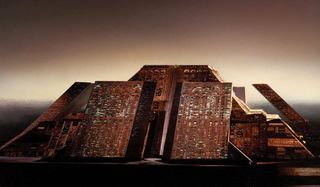
What Is The Tyrell Corporation?
Cinema has given us many great daunting conglomerates, from Alien's Weyland-Yutani to Terminator's Cyberdyne Systems to RoboCop's Omni Consumer Products, and Blade Runner's Tyrell Corporation certainly ranks as one of the most iconic. Named after its founder, Eldon Tyrell, the company is headquartered outside of Los Angeles, and while it's a business that develops different technologies, the most significant is the creation of replicants.
CINEMABLEND NEWSLETTER
Your Daily Blend of Entertainment News
Given the usefulness of replicant technology, the invention led to incredible fortune -- but it also led to a pretty terrible ending. In hopes of extending their lives past the pre-established expiration date, the aforementioned rogue replicants that Rick Deckard was hunting in 2019 successfully infiltrated Tyrell, and killed him when he couldn't give them what they wanted. The incident leads to legislation that ultimately bans the existence and creation of replicants -- and that remains the status quo for years until the arrival of Niander Wallace (played by Jared Leto in Blade Runner 2049), a visionary who buys the Tyrell Corporation, reinvents the design of replicants, and reinvigorates off-world colonization.
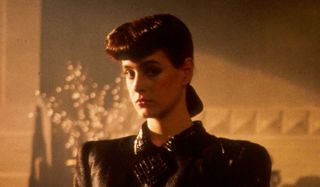
What Happened To Rick Deckard?
As you may have pieced together by now, Rick Deckard's final mission as a Blade Runner didn't exactly go well. Sure, after being beaten to a pulp he managed to survive the events, and all of the replicants -- including the leader, Roy Batty (Rutger Hauer) -- were retired... but a lot of innocent people died along the way, including Eldon Tyrell. Despite this, Ridley Scott's movie does technically have a happy ending, and what seems like a peaceful conclusion for the protagonist.
During his investigation and visits to the Tyrell Corporation, Rick meets Rachael (Sean Young) -- one of the advanced replicants who is unaware that she is a replicant until Rick administers a Voight-Kampff test on her. Through the events they fall in love, and while there is a point where it seems like Rick's partner, Gaff (Edward James Olmos), is aiming to retire her, he instead lets them go free. Laws say that they not only can't be together, but can't even be on the planet, so together they are forced on the run as fugitives and face an unknown future.
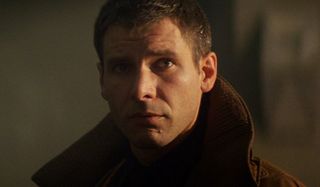
Is Rick Deckard A Replicant?
It would be crazy if a story about replicants who don't know if they're replicants didn't leave the audience with any mystery, but it's part of why Blade Runner is a legendary film. A key question that has lingered for the last 35 years is whether or not Rick Deckard himself is actually a replicant. Different cuts of Ridley Scott's movie contain evidence for and against both sides, which has only inspired more complex arguments among fans, and certainly not helping the situation is the fact that Scott and Harrison Ford have famously disagreed about the answer for decades.
Even without a firm confirmation the question of Rick Deckard's nature most importantly feeds into the key themes of Blade Runner and Phillip K. Dick's original novel, Do Androids Dream Of Electric Sheep. Specifically, the work is meant to inspire dialogue about the nature of existence and what it means to be human. It is a point worth emphasizing before the release of Blade Runner 2049 not only because Rick Deckard's story is continuing in the sequel, but also because Denis Villeneuve and writers Hampton Fancher and Michael Green have expanded on those same themes and successfully dive even deeper into the mystery.

Eric Eisenberg is the Assistant Managing Editor at CinemaBlend. After graduating Boston University and earning a bachelor’s degree in journalism, he took a part-time job as a staff writer for CinemaBlend, and after six months was offered the opportunity to move to Los Angeles and take on a newly created West Coast Editor position. Over a decade later, he's continuing to advance his interests and expertise. In addition to conducting filmmaker interviews and contributing to the news and feature content of the site, Eric also oversees the Movie Reviews section, writes the the weekend box office report (published Sundays), and is the site's resident Stephen King expert. He has two King-related columns.
Most Popular






